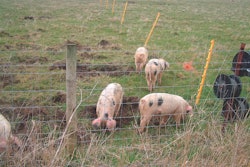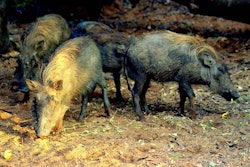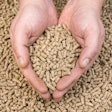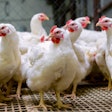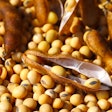
Sharp price rises for corn and soybean meal are behind the current near-collapse of the poultry meat and egg sectors in the West African state.
In the southwest Nigerian state of Ogun, many poultry farmers — as many as 350,000 — have been forced out of business. Feeling that the whole industry is under attack, Guardian of Nigeria reports that many more farmers are reducing flocks and destroying eggs. Without a corresponding rise in the prices of poultry meat and eggs, widespread losses of jobs and livelihoods look likely.
The overwhelming challenge for producers is the rapid and dramatic rise in costs of key feed ingredients: corn and soybean meal.
Since March, the price of soybean meal has risen by 12% to NGN123,000 (US$317) per metric ton (mt). According to the local chairman of the Poultry Association of Nigeria (PAN), the average price for a metric ton of corn has spiraled by 70% to NGN165,000 (US$425) over the same period. Not only is the price sky high, corn supplies have become scarce.
Calls for release of grain reserves …
In response to the crisis in the industry, the PAN official in Ogun state has called for the federal government to release grain reserves, as it did in Lagos.
At the end of last month, Vanguard News reported that the Lagos state government had donated 15 trailers of 50-kilogram bags of corn. Aimed as a cushion to reduce the impact of the coronavirus (COVID-19) pandemic , the corn was given to the Lagos chapter of PAN, and will be distributed to farmers in urgent need of support.
The donation was welcomed by the chapter’s chairman. He said the corn would help to stabilize the costs of poultry production in the state.
… and corn imports
Reporting that many small-scale poultry farmers had gone out of business in the southern state, the PAN chairman in Delta has urged the federal government to subsidize feed costs. He called on the federal government to open a window for the the importation of corn to overcome the shortfall in domestic production, reports Sun News.
Some producers are facing crippling poverty, while the investments of others are severely threatened, he said. Furthermore, the economy is being plunged into a deeper crisis by the impact on others in the value chain, such as chicken and egg traders and processors, and vendors of veterinary drugs and other supplies.
Over recent years, the local broiler industry has been booming, according to the official. Attributed largely to a ban on imports of frozen chicken, he said this benefit to food security could be reversed if the threat to local broiler production is not soon resolved.
Poultry sector faces multiple challenges
Across Nigeria, poultry farmers are facing other difficulties relating directly or indirectly to COVID-19.
In the central state of Plateau, one farmer told Sun News that he was unable to feed his birds properly, and was uncertain if his business would survive.
PAN official for Lagos state has called on the government to repair the roads, reports Vanguard News. The poor state of the roads leads to many of the region’s 45,000 eggs produced daily cracking and breaking on their way to local markets. This damage contributes to the low demand for eggs and other poultry products, she said.
In the northern part of the state, farmers fearful of attack from bandits are neglecting their farms. Meanwhile, multiple checkpoints on some key highways in the southwest are making truck drivers reluctant to pick up farm produce for sale in larger towns and cities.
Poultry production trends in Nigeria
Output of chicken meat and eggs in Nigeria declined by more than 20% between 2010 and 2018, the most recent year for which data have been published.
According to the statistics arm of the United Nations’ Food and Agriculture Organization, FAOstat, the country produced almost 192,700 mt of chicken and more than 481,400 mt eggs in 2018.


